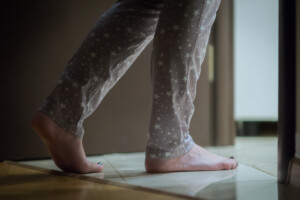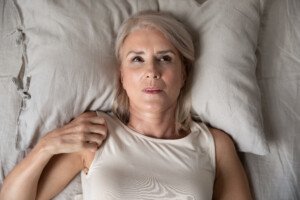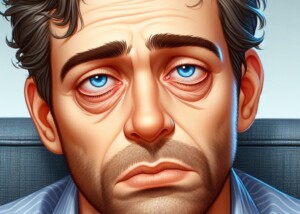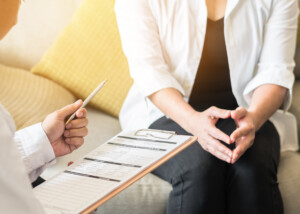
If anxiety truly causes nocturia (waking to urinate several times overnight), certainly there has to be a logical reason for this.
You may have read somewhere that stress can increase the urge to void.
But there’s a difference between feeling the urge and actually having more urine than usual to void.
Waking from overnight sleep to urinate should not happen more than once.
In fact, some doctors believe it shouldn’t happen at all, that the body fights to maintain uninterrupted sleep for optimal restoration – that the kidneys are supposed to shut down urine production and not load the bladder so that we can have completely restorative sleep.
Nocturia has many potential causes including prolapsed bladder, urinary tract infection, enlarged prostate and sleep apnea.
But anxiety?
First off, anxiety can cause insomnia. What may happen is that you keep awakening due to being unable to obtain deep sleep – due to all of your worries.

Shutterstock/fizkes
In this case, you are not being awakened by a bladder that needs to be emptied. You are being awakened by stress.
However, while you’re awake, why not use the toilet? You may feel a little bit of something in your bladder, so while you’re popped awake, you may as well relieve yourself. And you get only a trickle.
This is not true nocturia. It’s more of a convenience trip to the toilet, to prevent being awakened a few hours later by a full bladder – which may never happen.
But while people are awake due to anxiety or being awakened by a noise outside, they often “go” just as a precaution.
Urge vs. More Urine
“I was not able to find any information that stress increases urine flow from the kidneys,” says David D. Clarke, MD, President, Psychophysiologic Disorders Association (stressillness.com), Clinical Assistant Professor of Gastroenterology Emeritus, Oregon Health & Science University, and author of “They Can’t Find Anything Wrong.”
“I did find some older studies that suggested stress has little to no effect on this,” continues Dr. Clarke.
“So what is going on with people who have an anxiety disorder and experience more frequent need to empty their bladder during sleeping hours?”
You may suppose that it’s impossible for anxiety to affect a person while they are asleep, because by definition, being asleep means being unaware and thus, incapable of feeling stressed out.
However, think of ongoing anxiety as a malware program running in the background of a computer—the computer being your brain.
Malware runs in the background, unseen, undetected, but impairs computer function nevertheless.
If life events are stressing you out, this will act as malware in the background as you sleep.
“The person might be sleeping but their brains are still active, and an anxiety response can still take place,” says Dr. Clarke.
“People can wake in the middle of a panic attack, for example, that started while they were sleeping.
“So anxiety can have effects on the bladder of someone who is asleep similar to those that occur while awake.
“The sympathetic nervous system causes contraction of the bladder muscle leading to an urge to empty it.”
But remember, in this case, urge does not equal increased urine volume. So when you sit on the loo, you’ll get only a trickle if you don’t have true nocturia.
The sympathetic nervous system is the one that kicks into gear when you perceive a threat. This is the “fight or flight” response.
It’s easy to remember that the nervous system that jumps into action is the sympathetic one, because it has sympathy towards your dire situation!
Why would the fight or flight response cause contraction of the bladder muscle?
Dr. Clarke explains, “I suspect the survival advantage lies in not needing to void your bladder during a stressful event, but, as with many human responses, the intensity can reach counterproductive levels.”
This makes sense. Imagine needing to empty your bladder while you’re in the midst of fighting off danger or escaping from it.
Ancient man did not need any extra load on his body when faced with acute survival duress.
Modern man’s body responds the same way to anxiety and stress (e.g., traffic jams, hostile work environment, getting behind in bills, facing foreclosure, anticipating a dental appointment).
So perhaps the bladder muscle contracts as a way of reminding you to empty your bladder as much as possible. This is actually what athletes do right before a match.
In summary, anxiety and stress do NOT instruct the kidneys to load the bladder with more urine.
If this were the case, then stressed people would be on the toilet constantly throughout the day and voiding lots of fluid.
One of the most overlooked phenomena in the medical world is that of sleep apnea as a cause of nocturia!
If you’ve been plagued by overnight trips to the bathroom and have actually been doing a good bit of emptying – you may want to consider seeing a sleep medicine doctor before you see a urologist or gynecologist.
A person with sleep apnea can be 1) Thin, 2) Female, 3) Young adult, and 4) Physically fit.
Sleep apnea, a dangerous condition if left untreated, is typically caused by natural throat anatomy which is not influenced by diet or exercise.
For many with untreated sleep apnea, the ONLY felt symptom is a full bladder interrupting their sleep several times a night.

Since 1983 Dr. Clarke has successfully cared for over 7,000 patients with stress illness.
 Lorra Garrick has been covering medical, fitness and cybersecurity topics for many years, having written thousands of articles for print magazines and websites, including as a ghostwriter. She’s also a former ACE-certified personal trainer.
Lorra Garrick has been covering medical, fitness and cybersecurity topics for many years, having written thousands of articles for print magazines and websites, including as a ghostwriter. She’s also a former ACE-certified personal trainer.
.









































